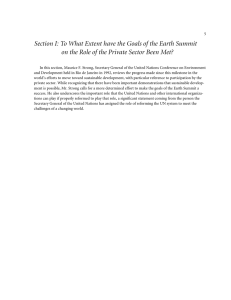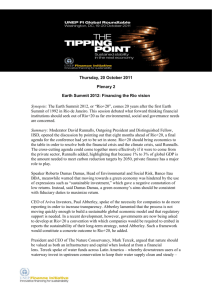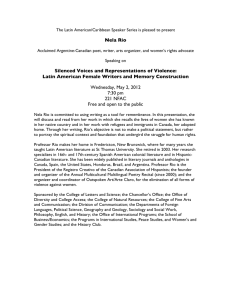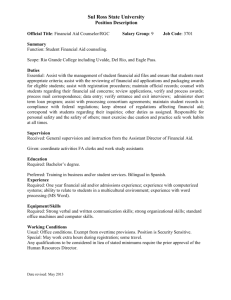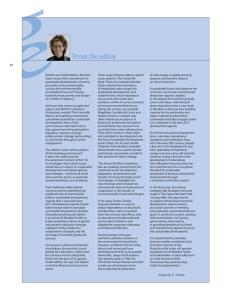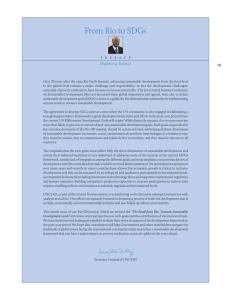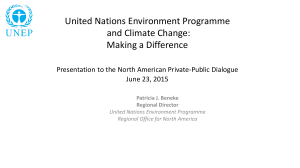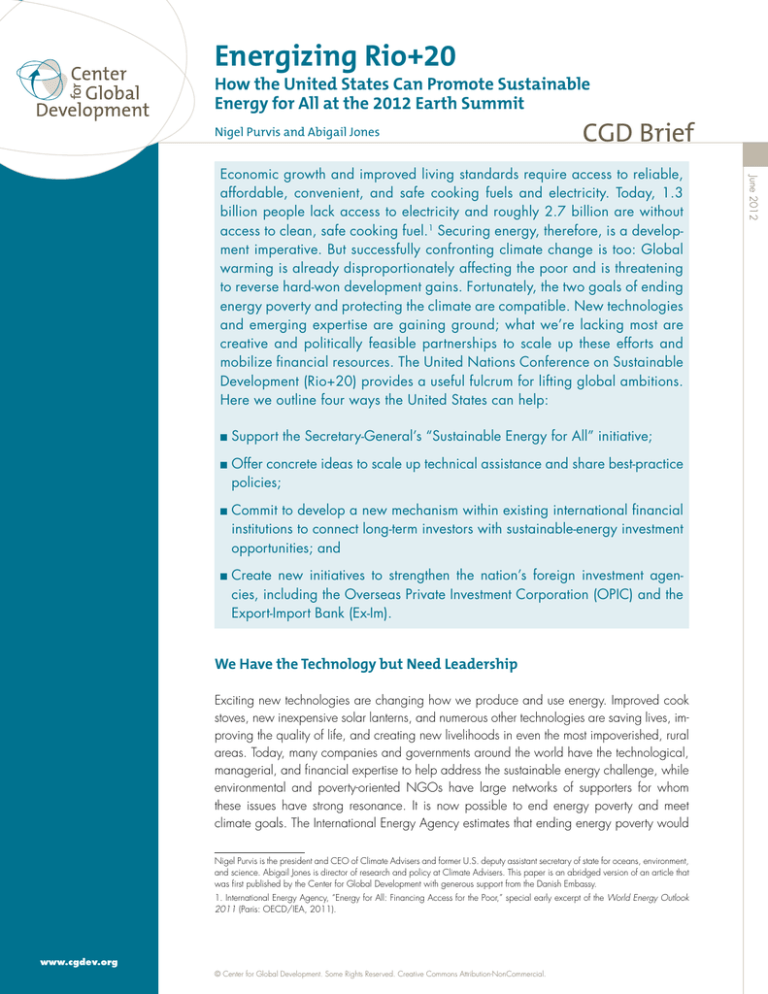
Energizing Rio+20
How the United States Can Promote Sustainable
Energy for All at the 2012 Earth Summit
Nigel Purvis and Abigail Jones
CGD Brief
n Support
the Secretary-General’s “Sustainable Energy for All” initiative;
n Offer
concrete ideas to scale up technical assistance and share best-practice
policies;
n Commit
to develop a new mechanism within existing international financial
institutions to connect long-term investors with sustainable-energy investment
opportunities; and
n Create
new initiatives to strengthen the nation’s foreign investment agencies, including the Overseas Private Investment Corporation (OPIC) and the
Export-Import Bank (Ex-Im).
We Have the Technology but Need Leadership
Exciting new technologies are changing how we produce and use energy. Improved cook
stoves, new inexpensive solar lanterns, and numerous other technologies are saving lives, improving the quality of life, and creating new livelihoods in even the most impoverished, rural
areas. Today, many companies and governments around the world have the technological,
managerial, and financial expertise to help address the sustainable energy challenge, while
environmental and poverty-oriented NGOs have large networks of supporters for whom
these issues have strong resonance. It is now possible to end energy poverty and meet
climate goals. The International Energy Agency estimates that ending energy poverty would
Nigel Purvis is the president and CEO of Climate Advisers and former U.S. deputy assistant secretary of state for oceans, environment,
and science. Abigail Jones is director of research and policy at Climate Advisers. This paper is an abridged version of an article that
was first published by the Center for Global Development with generous support from the Danish Embassy.
1. International Energy Agency, “Energy for All: Financing Access for the Poor,” special early excerpt of the World Energy Outlook
2011 (Paris: OECD/IEA, 2011).
www.cgdev.org
© Center for Global Development. Some Rights Reserved. Creative Commons Attribution-NonCommercial.
June 2012
Economic growth and improved living standards require access to reliable,
affordable, convenient, and safe cooking fuels and electricity. Today, 1.3
billion people lack access to electricity and roughly 2.7 billion are without
access to clean, safe cooking fuel.1 Securing energy, therefore, is a development imperative. But successfully confronting climate change is too: Global
warming is already disproportionately affecting the poor and is threatening
to reverse hard-won development gains. Fortunately, the two goals of ending
energy poverty and protecting the climate are compatible. New technologies
and emerging expertise are gaining ground; what we’re lacking most are
creative and politically feasible partnerships to scale up these efforts and
mobilize financial resources. The United Nations Conference on Sustainable
Development (Rio+20) provides a useful fulcrum for lifting global ambitions.
Here we outline four ways the United States can help:
Energizing Rio+20: How the United States Can Promote Sustainable Energy for All at the 2012 Earth Summit
2
only increase carbon dioxide emissions by 0.7 percent in
2030.2 The full potential of these technologies will be realized only through global partnerships. The United States
can lead the effort at the United Nations Conference on
Sustainable Development (Rio+20), which marks the 20th
anniversary of the original Earth Summit.3
Progress Is Possible Despite Economy
and Politics
With a presidential election campaign, high unemployment
rates, and financial uncertainty to deal with, the United
States is squarely focused on pressing domestic challenges.
There is almost no appetite for new international commitments and little pressure from U.S. constituents to deliver
at Rio+20. Environmental groups are concerned primarily
about domestic energy and clean air policies. Development
advocates are working hard to avoid draconian budget cuts
to foreign aid programs that may flow from the deficit reduction law passed in 2011.
Still, stronger U.S. leadership can advance both the vision
and promise of sustainable development, and outlining a
clear vision and a concrete set of policies for global sustainable development would be good U.S. foreign policy.
These are important challenges, and America has much to
offer if it decides to engage.
Recommendations
We have outlined a number of politically feasible recommendations for the Obama administration and Congress to
consider—ideas that would contribute to the global effort to
realize sustainable energy for all at Rio+20.
energy services, 2) double the global rate of improvement
in energy efficiency, and 3) double the share of renewable
energy in the global energy mix. While these goals lack
measurability as currently conceived (there are no baselines
against which to judge progress) and perhaps also a degree of ambition if defined too loosely, new energy goals
(like the Millennium Development Goals they mimic) would
likely bring greater global attention to energy poverty and
over time greater resources to bear on sustainable energy
deployment. At Rio, therefore, the United States could at
a minimum work to ensure that the international community
endorses the Secretary-General’s objectives and folds them
into a member-state–driven process to refine and expand by
a date certain.
2. Offer concrete ideas to scale up technical
assistance and share best-practice policies
The United States should offer concrete ideas for how to
scale up technical assistance and knowledge sharing on
best-practice policies that will help channel the $5 trillion
invested annually in energy infrastructure projects to sustainable alternatives. For example, the Clean Energy Solutions
Center, a virtual network of experts on and tools for energy
policy funded by the United States and Australia through the
Clean Energy Ministerial, should be expanded. The virtual
network should integrate the technical capacity of existing
bricks-and-mortar centers of applied policy research across
the world. Strengthening this global network would enable
nations to build domestic capacity and gather helpful insights about how best to achieve sustainable energy for all,
building on lessons learned elsewhere. To be effective, these
institutions should be prefunded by the international community to assist any government with the political will to tailor
and implement proven policies for achieving sustainable energy for all.
1. Support the Sustainable Energy for All Initiative
The United States should support the Secretary-General’s
“Sustainable Energy for All” initiative (sometimes referred to
as “SE4ALL”), which proposes that governments, businesses,
and civil society commit to three complementary goals to be
achieved by 2030: 1) ensure universal access to modern
2. Ibid.
3. For an extended discussion of the needed technologies, financing gap, and political context, please see Nigel Purvis and Abigail Jones, “Energizing Rio+20: How
the United States Can Promote Sustainable Energy for All at the 2012 Earth Summit,” Center for Global Development (April 2012): http://www.cgdev.org/content/
publications/detail/1426110.
This theory of change—spreading knowledge through a
global network of experts that serves as a global public
good that governments can access largely without cost—
is precisely how the international community spread the
knowledge needed for the green revolution in the 1960s
through the Consultative Group for International Agricultural
Research. While the subject matters are quite different, the
challenge is fundamentally the same: ensuring that people
everywhere learn what has worked elsewhere and apply
those lessons locally in appropriate and tailored solutions. In
the case of energy, as was true for agriculture, implementing
the right policies will be essential to success.
sustainable-energy investment opportunities
The United States should announce at Rio+20 its commitment to work with other nations to develop a new “deal flow
generator”—a new mechanism within existing international
financial institutions that would connect long-term investors
(including pension funds, life insurance, endowment funds,
and sovereign wealth funds) with Sustainable Energy for All
investment opportunities. According to the IMF, long-term institutional investors in developed nations held $60 trillion in
total assets, while bank assets in these countries amounted to
an additional $72 trillion in 2009. Many private investors,
including pension and sovereign wealth funds, are eager
to invest in sustainable energy ventures. What’s missing is
not interest or funds, but rather an abundance of investmentgrade opportunities. This new mechanism would, therefore,
1) aggregate sustainable energy projects to create largescale investment opportunities, 2) perform due diligence on
projects and rate investment opportunities to help private
investors manage risk, and 3) cluster projects or securitize
them to create liquid and tradable assets that could be
traded on private secondary markets. Such a mechanism
would naturally build on the work being done in the context
of the Brazil-U.S. Joint Initiative on Urban Sustainability, a
platform seeking to mobilize large-scale investment in green
infrastructure in both Rio de Janeiro and Philadelphia. As
part of this initiative, partners are working to aggregate and
bundle small-scale infrastructure projects into investment-size
portfolios for diverse investors ranging from the World Bank
to Goldman Sachs.4 Scaling up this effort to the global level
to support sustainable energy for all would provide a useful
starting point.
4. Shalini Vajjhala, Global Leaders Forum Presentation, Johns Hopkins School of Advanced International Studies (Washington), March 16, 2012.
the nation’s foreign investment agencies
The U.S. government should announce a suite of new initiatives to extend the impact of the nation’s foreign investment
agencies, including the Overseas Private Investment Corporation (OPIC) and the Export-Import Bank (Ex-Im). In addition
to more funding, which remains essential, the United States
should expand beyond the use of traditional techniques and
offer new products such as “first loss” funds; dedicated seed
funding to help small and medium businesses work with developing countries to develop sustainable energy projects;
cofinancing initiatives with counterparts in Germany, Japan,
and other developed nations to more effectively align and
leverage available global public funding; and a new equity
fund reserved only for equity investments that have high expected returns from a sustainable energy for all standpoint.
Conclusion
A major global effort to promote energy efficiency, renewable energy, and energy access in the name of sustainable
energy for all would produce tremendous benefits for international development and the climate. While the economic,
fiscal, and political conditions for such a campaign are far
from ideal, the Rio+20 summit in June presents a number of
important opportunities for progress—including the establishment of clear and compelling global clean energy and energy access goals and public-private partnerships that move
the world decisively toward action.
The United States must do its part. Our recommendations, focused on private enterprise, economic growth, and expanding trade, would advance U.S. economic, development,
and climate goals in ways that would attract broad political
support at home and abroad. Sustainable development requires sustainable energy, and the United States should be
at the forefront of promoting both.
3
June 2012
3. Help connect long-term investors with
4. Create new initiatives to strengthen
The
Center
for
Global Development
poverty and inequality through rigorous
engagement with the
policy
works to reduce global
research
and active
community to make the world a more
prosperous, just, and safe place for us all. The policies and practices of
the United States and other rich countries, the emerging powers, and
international institutions and corporations have
significant impacts
on the developing world’s poor people. We aim to improve these policies
and practices through research and policy engagement to expand
opportunities, reduce inequalities, and
improve lives
www.cgdev.org
Energizing Rio+20:
How the United States Can Promote Sustainable
Energy for All at the 2012 Earth Summit
Nigel Purvis and Abigail Jones
CGD Brief
June 2012
everywhere.

